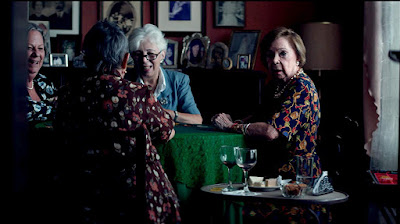As the past is relived, we're awash in marvelous old movie images from so many European and American movie classics, as we learn that the dear departed -- the projectionist at the local cinema -- was the man who helped this boy find his place in life as well as his career.
That's right: a projectionist of film, a profession that today barely exists in our current age of digital. When was the last time you were in a theater in which a projectionist ran the film? For that matter, when was the last time you were even in a theater? Add another layer of nostalgia here. Proust would kvell.
That this projectionist/mentor is played by that late, great and amazing French actor, Philippe Noiret (above, top) is another huge plus, along with the beautiful job done by Salvatore Cascio (below with Noiret and on poster, top), who plays the adorable, energetic, funny and altogether delightful child in what is one of the truly memorable performances by children in the history of film.
Nearly half of Cinema Paradiso involves our hero as a child. Once he transitions to young adult, the character is played by the then-gorgeous young actor Marco Leonardi, (above, left, and below, right) in whose budding love life we (and the projectionist) become involved.
If Tornatore is not a particularly subtle filmmaker, neither is he heavy-handed. Cinema Paradiso is broad in both style and performance, but all of it works and at precisely the right level. (Only the not-so-great old-age make-up seen on some of the characters toward film's end stands out as too much.) The film also grows more beautiful visually as it moves along.
"Movies are finished," one character intones toward the finale, and soon our now-aged hero is walking through the old deserted and dilapidated movie house that once brought him such joy. The film has renewed resonance today, as we watch what might be the last gasp of movie theaters worldwide, due to this ongoing pandemic. Let's hope not.
From Arrow Academy, distributed here in the USA via MVD Entertainment Group, and full of terrific extras that include a nearly hour-long recap of Tornatore and his career (up until 2000, when the documentary was made) which will make you want to go back and watch every one of his films once again; another half-hour doc about the making of this film, its sudden withdrawal from the Berlin Film Fest, its subsequent wondrous Cannes debut, and who picked it up for U.S. distribution; and finally a recap of the famous kissing sequence, with each film and actors identified. Cinema Paradiso arrived on DVD, Blu-ray and 4K UHD earlier this month. If you're already a fan, a revisit is in order. If you've never seen this lovely, award-winning film, what delight lies ahead!























































